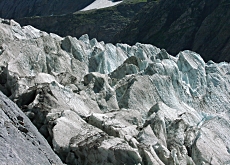
Final meltdown nears for alpine glaciers

Researchers at Zurich University are forecasting that alpine glaciers will all but vanish by the end of the century if global warming is not halted.
Results of computer modelling experiments show that the Alps will lose 80 per cent of their glacier cover if summer air temperatures rise by three degrees Celsius.
“Especially in densely populated high mountain areas such as the European Alps, one should start immediately to consider the consequences of such extreme glacier wasting on the hydrological cycles, water management, tourism, and natural hazards,” said lead author of the report, glaciologist Michael Zemp.
Although not part of the study, a huge mass of rock (about two million cubic metres) currently threatening to break off the Eiger mountain has been caused by the retreat of the Lower Grindelwald Glacier over the past few decades, geologists believe.
Experts say the glacier acted as a supporting wall, and melt water from the remaining ice has been able to seep between the rocks, creating large cracks.
Zemp and his team noted that in the 1970s, about 5,150 alpine glaciers covered a total area of 2,909 square kilometres. This represented a loss of about 35 per cent of glacial area compared with 1850.
But the meltdown has accelerated rapidly since the 1970s, resulting in a total loss of 50 per cent of the 1850 area. In the extraordinarily hot summer of 2003 alone, the volume of the remaining ice decreased by between five and ten per cent.
The study found that if temperatures were to rise by five degrees, the Alps would become almost completely ice-free by 2100.
Future scenario
According to the Intergovernmental Panel on Climate Change (IPCC), an increase in summer air temperature of one to five degrees Celsius by the end of the 21st century is a plausible scenario.
The researchers say that for each one degree Celsius increase in mean summer temperature, precipitation would have to increase by 25 per cent to offset the glacial loss.
“Our study shows that under such scenarios, the majority of alpine glaciers might disappear within the coming decades,” said Zemp.
His team concluded that with an increase in summer temperature of more than three degrees only the largest glaciers, such as the Aletsch in Switzerland and those on the highest mountain peaks could survive into the 22nd century.
The scientific paper highlights the importance of the research, stating clearly that “rapidly shrinking glacier areas, spectacular tongue retreats, and increasing mass losses are clear signs of the atmospheric warming observed in the Alps during the last 150 years”.
The results of the study will be published on July 15 in the Geophysical Research Letters, a journal of the American Geophysical Union.
swissinfo with agencies
Switzerland’s glaciers lost 18% of their surface between 1985 and 2000. In the Alps, the average loss has been 22%.
Swiss glaciers are melting more slowly because most of them are at high altitude.
Meltdown affects smaller glaciers – which represent 18% of total glacier surface but nearly half the losses incurred – first, according to a 2004 study from Zurich University.

In compliance with the JTI standards
More: SWI swissinfo.ch certified by the Journalism Trust Initiative




























You can find an overview of ongoing debates with our journalists here . Please join us!
If you want to start a conversation about a topic raised in this article or want to report factual errors, email us at english@swissinfo.ch.